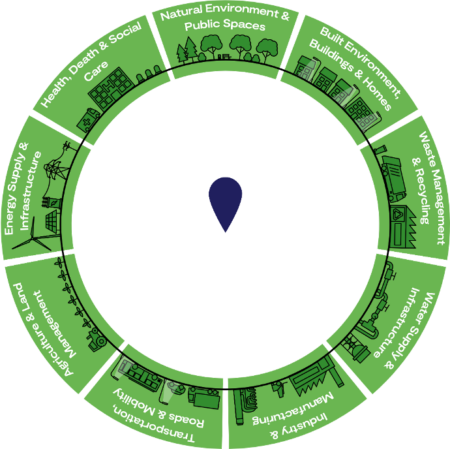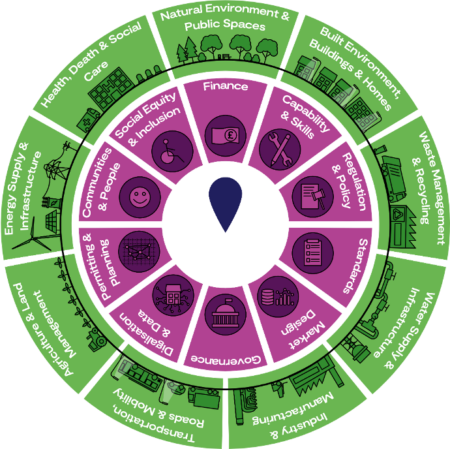Systems thinking and non technological barriers
In order to achieve the transition to net zero every sector will need to find and deploy solutions to reduce its carbon emissions.
Many technological solutions already exist, however progress in delivering and adopting these at scale is slow. When we consider the deployment of these solutions within a place, taking into account social, economic and environmental considerations, then we start to identify a new set of non-technological barriers to accelerating delivery.
The Net Zero Living programme targets specific non-technological barriers, including net zero planning, citizen engagement, business engagement, data, finance, and policy and regulations—to help places use innovative methods of removing the non-technological barriers to demand that are slowing down the rapid scale-up and adoption of net zero solutions.
We know that place-based net zero approaches deliver much better outcomes for people, but the places where we live and work are where technical, social and economic systems come together in very complex ways. We need to consider how these systems work together in order to accelerate delivery and progress.
What do we mean by non technological barriers and a systems-based approach?

Your place is defined by its unique geography, culture and people. However all places emit carbon through activities such as transport, energy, heating, which are all associated with the physical elements, for example, housing, offices, transport systems, that define your place.

These physical elements combine together to create the systems that make your place what it is and keep it alive and well. However, for these physical systems to work, they must be underpinned and enabled by a multitude of social systems.

All of these physical and social systems interact with each other and with other stakeholders to create a complex web and within that complexity comes the creation of non-technological barriers that prevent a smooth and just transition to net zero.
How is the Net Nero Living programme overcoming these barriers?
The Net Zero Living programme is understanding and innovating to overcome these barriers through investing in places and their specific, local needs to accelerate our journey to net zero.
We are funding projects that range from how to engage local communities about potential community energy projects, developing methods for delivery planning from strategic planning tools such as local area energy plans, exploring new financing mechanisms to deliver retrofit and heat pump schemes with no up front cost to consumers and how to build investible pipelines of activity that can deliver environmental, economic and social benefit in a place.
Our projects are in flight and are due to complete during summer and autumn 2025, when we look forward to sharing the learning and outputs for others to be able to use and identify the key success factors and benefits of an integrated systems and place-based approach to delivering net zero.
Related programme

Net Zero Living
A new wave of place-based innovation is transforming UK towns, cities and communities, today. Innovate UK’s £60 million programme is helping local authorities and businesses work together to deliver new solutions that improve local services and open markets for economic growth.

